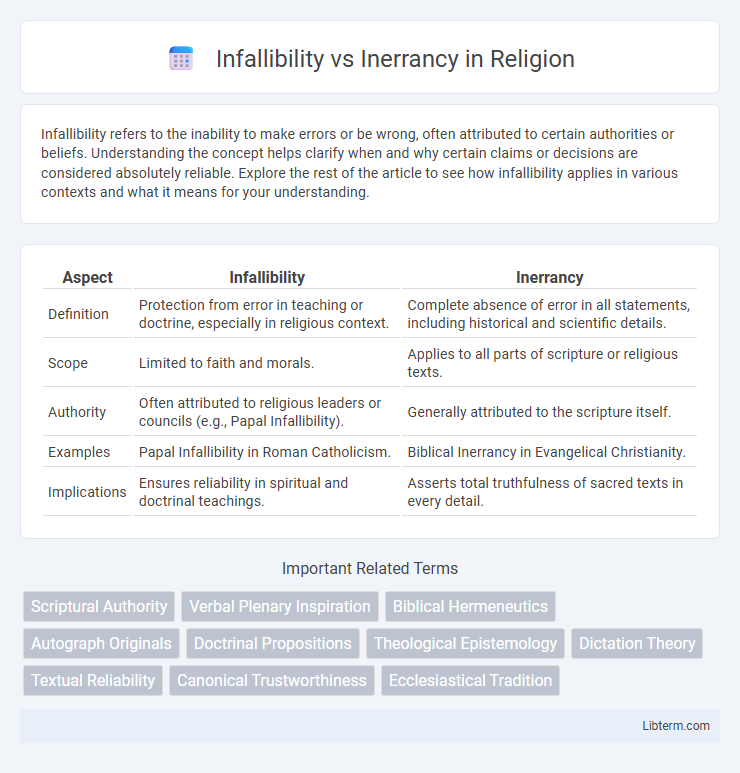Infallibility refers to the inability to make errors or be wrong, often attributed to certain authorities or beliefs. Understanding the concept helps clarify when and why certain claims or decisions are considered absolutely reliable. Explore the rest of the article to see how infallibility applies in various contexts and what it means for your understanding.
Table of Comparison
| Aspect | Infallibility | Inerrancy |
|---|---|---|
| Definition | Protection from error in teaching or doctrine, especially in religious context. | Complete absence of error in all statements, including historical and scientific details. |
| Scope | Limited to faith and morals. | Applies to all parts of scripture or religious texts. |
| Authority | Often attributed to religious leaders or councils (e.g., Papal Infallibility). | Generally attributed to the scripture itself. |
| Examples | Papal Infallibility in Roman Catholicism. | Biblical Inerrancy in Evangelical Christianity. |
| Implications | Ensures reliability in spiritual and doctrinal teachings. | Asserts total truthfulness of sacred texts in every detail. |
Understanding Infallibility and Inerrancy
Infallibility refers to the inability of a teaching or document, such as religious scripture, to err or lead believers astray in matters of faith and morals, emphasizing reliability in guidance. Inerrancy, by contrast, asserts that the scripture is without any factual or historical error in all its assertions, encompassing not only spiritual truths but also scientific and historical details. Understanding these distinctions clarifies debates in theology, highlighting infallibility's focus on doctrinal trustworthiness and inerrancy's claim of absolute accuracy.
Historical Origins of the Debate
The historical origins of the Infallibility vs Inerrancy debate trace back to early church councils and theological reflections on Scripture's authority, particularly during the Reformation when varying views on biblical truth emerged. Infallibility posits that the Bible is trustworthy in matters of faith and salvation, while inerrancy asserts the Bible is without error in all its assertions, including historical and scientific details. Key figures such as Martin Luther and John Calvin contributed significantly to shaping these doctrines, influencing Protestant and Catholic perspectives through centuries of theological discourse.
Definitions: Infallibility Explained
Infallibility refers to the inability to fail in accomplishing its purpose or to teach error in matters of faith and morals, particularly in religious contexts. It signifies that certain teachings or doctrines are completely trustworthy and free from error by virtue of divine authority. This concept is distinct from inerrancy, which emphasizes the absence of any factual or historical mistakes in sacred texts.
Definitions: Inerrancy Clarified
Inerrancy refers to the doctrine that the Scriptures are completely free from error in all their teachings, including historical and scientific details, affirming absolute accuracy and reliability. Infallibility, in contrast, emphasizes the Bible's trustworthiness and authority in matters of faith and moral teaching, allowing for minor human imperfections in non-essential areas. Clarifying inerrancy involves understanding it as a comprehensive claim about the total truthfulness of biblical texts, beyond merely spiritual or doctrinal infallibility.
Scriptural Basis for Infallibility
The Scriptural basis for infallibility is grounded in passages such as Psalm 19:7, which states, "The law of the Lord is perfect, converting the soul," emphasizing the reliability and trustworthiness of Scripture in guiding believers without error in its purpose. John 10:35 affirms that "Scripture cannot be broken," reinforcing the idea that Scripture is incapable of leading believers astray in matters of faith and practice. These verses underscore infallibility's focus on Scripture's unfailing authority and efficacy in accomplishing God's intended spiritual outcomes.
Scriptural Basis for Inerrancy
Inerrancy of Scripture is grounded in passages such as 2 Timothy 3:16, which states that all Scripture is God-breathed and profitable for teaching, reproof, correction, and training in righteousness. Psalm 19:7 emphasizes the perfection of the law of the Lord, converting the soul, which supports the doctrine of Scripture being free from error. Proverbs 30:5 declares that every word of God is pure, reinforcing the belief that God's Word is without any mistake in its original manuscripts.
Key Differences Between Infallibility and Inerrancy
Infallibility refers to the belief that the Bible is completely trustworthy and reliable in matters of faith and practice, while inerrancy asserts that the Bible is without any factual or historical errors in all its assertions. Infallibility allows for minor discrepancies or figurative language, emphasizing doctrinal truth, whereas inerrancy demands absolute precision in every detail, including scientific and historical facts. The key difference lies in the scope: infallibility protects spiritual and moral teachings, inerrancy extends to total factual accuracy.
Theological Implications of Each View
Theological implications of infallibility emphasize that Scripture is entirely trustworthy in teaching faith and practice without error in its intended spiritual message, fostering confidence in doctrinal authority while allowing for minor historical or scientific inaccuracies. Inerrancy asserts that the Bible is without any error in all aspects, including factual claims, underpinning a literal interpretation that shapes doctrinal formulations and moral standards rigidly. These differing views influence hermeneutics, ecclesial authority, and the scope of biblical interpretation within Christian theology.
Modern Perspectives and Controversies
Modern perspectives on infallibility and inerrancy often distinguish infallibility as the Bible's trustworthiness in faith and practice, while inerrancy asserts the absence of any factual errors in the original manuscripts. Contemporary controversies arise over interpreting biblical texts in light of historical-critical methods, with some theologians emphasizing the Spirit's guidance over literal accuracy. Debates also focus on how these doctrines impact biblical authority, hermeneutics, and the acceptance of scientific findings.
Impact on Faith and Biblical Interpretation
Infallibility emphasizes the Bible's reliability in matters of faith and practice, supporting believers' trust that Scripture will not lead them astray in spiritual truths. Inerrancy asserts the complete factual accuracy of the Bible, influencing interpretations by insisting that every detail is historically and scientifically correct. This distinction shapes theological approaches, with infallibility promoting a faith-centered engagement and inerrancy demanding precise literalism in biblical interpretation.
Infallibility Infographic

 libterm.com
libterm.com